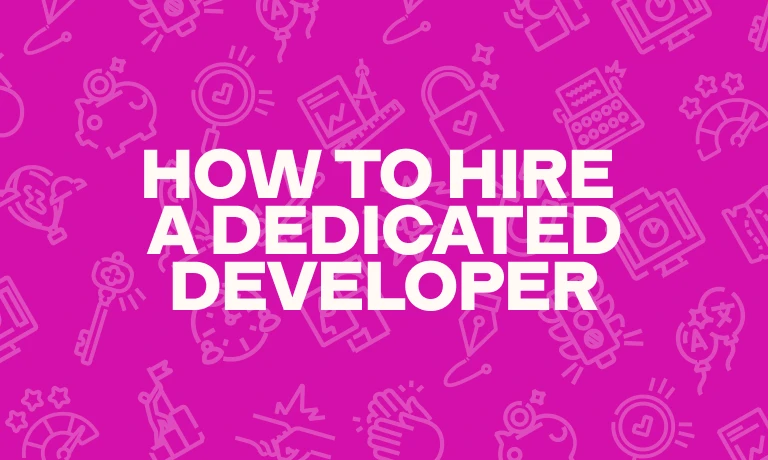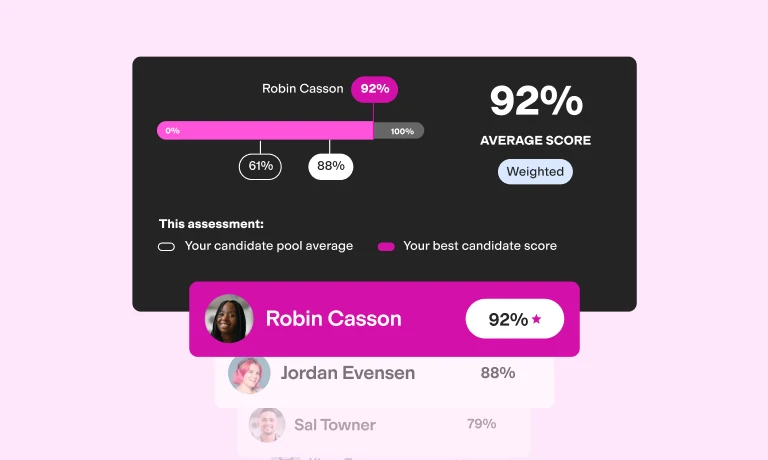White fonting – aka “the small white word trick” – is the practice of stuffing resumes with relevant keywords in white font. This means they get picked up by resume screening tools but can’t be seen by humans.
While it’s not new, white fonting has gained in popularity recently thanks to TikTok influencers claiming it’ll help you get noticed.
Unfortunately, it’s not the only “black hat” trick candidates use to game the system. At best, these tactics erode trust and waste time and resources. At worst, they might result in you making a bad hire.
In this post, we’ll look at six ways candidates cheat on applications and why. We’ll also explore how you can guard against cheating, including by switching to fairer hiring practices.
6 ways candidates cheat on applications
White fonting may be the latest on-trend resume cheat, but it’s not the only trick in the book. Here are six more:
1. Lying on resumes
From inflating job titles and tenure to lying about why they left a job, 78% of applicants have misrepresented themselves on applications.
According to a Checkster study, 60% claimed skills they didn’t have, 42% made up relevant experience, and 39% said they’d attended a more prestigious university.
In an extreme example, Australian Veronica Hilda Theriault lied about her experience and used a photo of supermodel Kate Upton on her profile to land a job with the Australian government. She was found out and sentenced to 25 months in jail, but many candidates get away with lying, as we’ll see below.
Read our blog about how to stop candidates lying on resumes for more on this topic.
2. Plagiarism
This involves candidates copy-pasting content from other sources into their resumes or cover letters to make their skills or experience seem stronger than they are. For example, from sample resumes or online profiles.
With the rise of generative AI, it’s also now easier to create compelling resume content. While using tools like ChatGPT to polish your resume isn’t illegal, using copy without checking it could also result in plagiarism.
3. Over-optimizing resumes
The use of applicant tracking systems (ATS) to screen resumes has led to candidates stuffing them with relevant keywords in an attempt to pass the filters and stand out. This can result in resumes that are so over-optimized that they misrepresent the candidate’s real skills and experience.
You don’t even need to be an expert in search engine optimization techniques these days. There are numerous resume-checking tools that allow you to upload your resume, check it against a job description, and get suggestions on how to optimize it. While they’re not intended to help people cheat, they certainly make it easier to do so.
4. Submitting multiple applications
This happens for various reasons. Some candidates are out to game the system, in the mistaken belief that sending in multiple applications will give them a better chance of landing the role. Others are simply not clear about which of several open roles they really want.
Either way, it wastes time for hiring professionals and could result in more qualified candidates being overlooked. In any case, if you’re using an ATS it’s a waste of time as duplicate applications will be detected and rejected automatically.
5. Submitting fake references
This is a common practice, with nearly 44% of applicants saying they have or would fake references.
These come in many forms. For example, listing fake contact details in the hope recruiters won’t follow up; asking a friend, family member, or coworker to pose as an employer; or inventing a fictitious referee. As well as generative AI, there are also numerous letter-writing services available which increase the chances of coming up with a compelling – but fake or inflated – letter of recommendation.
6. Gaming online assessments
Online assessments are an important tool to check whether candidates have the skills and experience they claim, but they’re also vulnerable to cheating. Here are a few ways candidates try to do that:
Getting help. Candidates may share their screens with others or have someone present to provide help. Some may even get another person to take the test.
Using resources and aids. Candidates may use tools like calculators or the internet to look up answers.
Prior knowledge. If candidates somehow gain access to questions before the test, they can prepare for it or have a “cheat sheet” of answers on hand.
Technical manipulation. Tricks to game the system include taking the test multiple times or manipulating question timers to add more time. Very savvy candidates may even be able to manipulate their answers or results in the database after the test.
Why do candidates cheat on applications?
Now that you know how candidates cheat, let’s look at why. Spoiler alert: It’s not always because they’re lazy or unethical.
Difficulty standing out. Over 50% of candidates felt they failed to pass resume screening due to a lack of relevant experience or qualifications. This is particularly a problem for Gen Z who are often passed over in favor of teenagers for low-skilled jobs and younger millennials for ones that require more experience.
Too-stringent job requirements. Many employers ask for a four-year degree or arbitrary years of experience, even when these aren’t necessary or a predictor of job success. This leads to desperate candidates inflating resumes to get a foot in the door.
Unconscious bias. The sight of a prestigious university, desirable address, or good-looking photo on a resume may play into recruiters’ unconscious biases, and candidates know this. Others may be concerned about being rejected due to factors like a criminal record, their age, or sexual orientation, leading them to conceal the truth.
It’s unintentional. Candidates may undervalue or misrepresent their skills and experience due to imposter syndrome or because they don’t know how to present themselves.
Because they can. While nobody wants to hire a liar, over half of hiring managers are willing to if they can’t find a better candidate. Younger recruiters are the most lenient, with 69% percent of those under 35 saying they would hire dishonest applicants sometimes vs 60% of the over-45s.
The best insights on HR and recruitment, delivered to your inbox.
Biweekly updates. No spam. Unsubscribe any time.
5 ways to stop candidates from gaming the system
Now, let’s look at how you can stop this by implementing safeguards and a fairer hiring process that doesn’t tempt – or allow – candidates to cheat.
1. Establish ethical standards and checks
When announcing the results of the Checkster study, chief executive officer Yves Lermusi noted: "While some behaviors are defined by law as illegal – like hiring a doctor without proper credentials – most are in an ethical gray area.”
Yves also correctly identified that HR managers may have differing views on what's unethical and what’s just a “white lie.”
To overcome this, establish ethical standards drawing exactly where the lines in the sand lie for your organization. Start by using a questionnaire to sound out your hiring team’s understanding of ethics before delivering training to get them all on the same page.
Additionally, you should use thorough background checks. For example, checking out candidates’ online profiles, as well as their contact details, universities, and employers’ websites.
2. Drop unnecessary job requirements
These days, many employers insist on a four-year degree – even for entry-level jobs – in the mistaken belief that this will provide the digital skills they increasingly need.
Known as “degree inflation” this practice narrows your talent pool, contributes to continued inequality in the workplace and society, and encourages candidates to lie.
As mentioned above, many job ads also specify a certain number of years of experience. While this tells you the candidate has experience, it doesn’t tell you anything about the quality of that experience. This makes experience an unreliable predictor of job success.
Dropping mandatory requirements for degrees and experience, therefore, gives you access to a wider global talent pool of candidates who don’t need to lie. It also lets you build more diverse teams that can transform your business.
3. Switch to skills-based hiring
If resumes are vulnerable to keyword stuffing and fabrication, there’s an easy solution: stop using them.
Resumes have been around since the 15th century when Leonardo Da Vinci supposedly outlined his skills and experience in a letter requesting employment with the Duke of Milan. They’ve changed little since then.
Fortunately, there’s now a better way to find the right people for your open roles: skills-based hiring.
Objective talent assessments reveal whether a candidate really has the skills and experience they claim. They also overcome hiring bias by putting recruiters’ assumptions about candidates to the test.
As well as helping you hire the right people, skills-based hiring levels the playing field for diverse candidates, which benefits your business and promotes social mobility.
The State of Skills-Based Hiring 2025
Read TestGorilla's annual report to discover why 85% of companies are choosing skills-based hiring s in 2025.
Some tests you can use include hard skills tests like Data Modeling Concepts or Advanced Algorithms or soft skills tests like Leadership and People Management or Communication.
Check out the TestGorilla library for more tests, including Motivation and Culture Add, which can help you get a better picture of how your candidate would integrate into your company.
4. Guard against cheating during online assessments
As we saw earlier, there are a lot of ways candidates can cheat on online tests. One way to overcome this is to use multiple tests to get a more accurate, rounded picture of their skills.
Here are some other ways to prevent it:
Prevent them from preparing. With TestGorilla, candidates only learn which tests they’ll be taking at the start of the assessment, so they can’t prepare. We also only allow people with a business email to sign up as a customer, so they can’t register ahead of time and get access to tests. Even if they do manage this, questions and answers are hidden, so it won’t help them.
Use randomized questions. We also use an algorithm to choose questions at random from a bank of hundreds and only use the same question a certain number of times before retiring it.
Prevent multiple attempts. TestGorilla only allows one email address per attempt to help prevent people from trying again.
Disable copy-paste. This makes it much harder to share the content from the test screen with others.
Set time limits. This ensures a level playing field for all candidates and means they shouldn’t have time to search for answers.
Use anti-cheating measures. At TestGorilla these include IP-based location tracking to tell if the same candidate has made it past our filters or used a different email address or device. We also take snapshots and use full-screen and mouse tracking to detect if they exit the test window to search for answers, look at their phone, or have someone else present.
5. Use behavioral interview techniques
Asking behavioral questions in interviews lets you assess candidates' personal skills, motivations, and personality, as well as verify what they say on their resume. They also provide insights into future job success, how people perform under pressure, where they’ll need support, and how they might contribute to your culture.
Most importantly, this helps eliminate unconscious bias when questions are used in a structured, standardized way for all candidates. Of course, questions about race, ethnicity, age, or background are also strictly off-limits.
Behavioral questions involve asking about specific scenarios and how people handled or would handle them. Anyone who has the skills and experience they claim should be able to answer these kinds of questions and provide their rationale.
Some questions you can ask include:
Which skills would you say are essential for teamwork?
How do you prioritize tasks?
How do you handle feedback?
How do you react to changing task requirements?
See here for 50 behavioral interview questions to fit a range of scenarios.
Skills-based hiring: Fairer hiring, fewer cheats
Candidates use a range of tricks to game the application process, from keyword-stuffing to inflating their background, qualifications, and experience.
Sure, some people are downright dishonest, but many are just trying to get ahead in the face of societal norms and biased hiring practices that make it difficult to get a foot in the door.
Unless a candidate went to an Ivy League university, it can be hard to stand out based on their resume alone – which is why we think it’s time to ditch resumes.
Switching to skills-based hiring offers a fairer, more objective way to assess candidates based on their skills and abilities – not who they are or where they come from. This lets you build more diverse teams that make a positive contribution to your culture and are in it for the long haul.
Find the right people for your open roles – every time. Skills-based hiring tells you whether they’ve got the skills you need. Check out the 2024 State of Skills-Based Hiring Report to learn more |
Related posts
You've scrolled this far
Why not try TestGorilla for free, and see what happens when you put skills first.






















